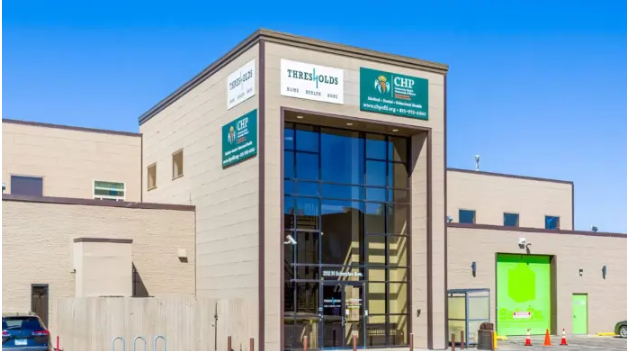Overview
Located in Kankakee, Illinois, Thresholds Center for Mental Wellbeing is an extensive outpatient facility that provides a broad range of treatments for both mental health treatment and addiction rehabilitation. This clinic is a critical resource for the community, offering customized treatment and a comprehensive approach to help people on their road to wellness as the sole provider of mental health services in Kankakee County.
At Thresholds, they are aware of the close relationship between mental health treatment and addiction rehabilitation. The facility makes sure people have access to the help they need to sustain long-term sobriety by offering comprehensive addiction counseling, group therapy, peer support groups, and relapse prevention training. What makes Thresholds unique are its comprehensive mental health care programs, which go beyond addiction treatment and provide all-encompassing help for a range of mental health issues. Serving as a mental health home for anybody in need of their services, they want to connect clients with other resources that might help them on their path to recovery while also providing case management.
Meeting customers where they are—literally and figuratively—is something the Thresholds staff takes great pleasure in. They are able to provide treatments in well-known environments because to their community-based strategy, which lowers treatment obstacles and promotes a feeling of community. Aiming to treat the whole person, they provide primary care assistance in addition to psychiatric and addiction treatment, making sure that all facets of a client's health are taken care of. To ensure that everyone has access to basic services, the center provides sliding scale payment choices for people who are financially disadvantaged.
Apart from providing addiction treatment, the institution is essential in crisis intervention, providing specialist assistance to those going through severe periods of mental illness. Their partnership with the 988 mental health emergency hotline guarantees prompt support to anyone in need, providing them with compassionate and knowledgeable crisis guidance. Thresholds hopes to provide a lifeline for those dealing with the combined problems of drug abuse and mental health illnesses by combining these services.
Since its founding in 1959, Thresholds has grown to become one of Illinois' biggest and most established providers of rehabilitation services for those struggling with mental health issues and drug abuse. Thresholds continues to be committed to providing proactive outreach, case management, housing, job, education, psychiatry, and drug use treatment. With more than 75 sites, the organization offers over 30 creative programs. Their methodology is on enabling people to take back control of their lives by providing them with the assistance and resources need to achieve self-sufficient and purposeful lives within their communities.
Thresholds' commitment to inclusion is shown by its service to a variety of demographics, including young moms, the deaf community, veterans, and those who are homeless. Regardless of their upbringing or situation, they think every customer has the capacity to lead a happy life. Thresholds helps clients to build on their abilities and rediscover their strengths via individualized goal-setting and a network of support, fostering a positive sense of self and paving the road for long-term rehabilitation.
The center's mission is to promote a community in which recovery from mental health and drug use disorders is not only feasible but attainable by offering comprehensive healthcare, shelter, and hope to those in need. Thresholds, with a history of compassion and creativity, is a light of hope that transforms lives and creates healthier communities across Illinois.
Thresholds at a Glance
Payment Options
- Community Mental Health Block Grants
- Medicaid
- Private health insurance
- Cash or self-payment
- State mental health agency (or equivalent) funds
Assessments
- Comprehensive mental health assessment
- Comprehensive substance use assessment
Age Groups
- Adults
- Young adults
- Seniors
Operation
- Private for-profit organization
Treatment At Thresholds

Conditions Treated
Mental health treatment:
Mental health facilities offer a safe space for individuals to get specialized care. Trained experts create personal plans using therapies, possibly including medication. The goal is to help individuals cope better and lead fulfilling lives, with constant support and a community feel.
Substance use treatment:
Substance use rehabilitation is a comprehensive treatment approach designed to assist individuals struggling with addiction to drugs or alcohol. This form of rehabilitation addresses both the physical dependency, often starting with detoxification, and the psychological triggers, using various therapeutic methods. The objective is to empower individuals to achieve and maintain sobriety, while equipping them with the tools and coping strategies needed to reintegrate into society and lead a substance-free life.
Co-occurring Disorders:
Dual-diagnosis rehabilitation centers often offer the most suitable approach for addressing concurrent mental health and substance abuse issues. These facilities typically employ a team of medical and behavioral specialists who utilize a variety of interventions and create a conducive healing environment to support your journey toward lasting recovery. Their comprehensive treatment approach typically encompasses evidence-based therapies such as cognitive-behavioral therapy, recovery support meetings, 12-step facilitation, psychoeducation, skills training, and group therapy to help you achieve and maintain long-term wellness.
Alcoholism:
Alcohol addiction is a disease that changes the way the brain works. It causes negative emotions, impulsive behavior, cravings and withdrawal symptoms. Treatment for alcohol addiction includes supervised detox, counseling and therapy, and support group participation. Rehabilitation does not cure alcoholism. Instead, it helps the individual manage their addiction, restore their functioning, and well-being.
Opioid Treatement:
Opioid addiction rehabilitation is a specialized treatment process tailored to address the unique challenges and complexities of opioid dependence, including drugs like heroin and prescriptions like oxycodone. The process typically begins with a medical detox to ease withdrawal symptoms, followed by therapeutic interventions to address the root causes of addiction. This holistic approach aims to provide individuals with the skills and support needed for long-term recovery from opioid use.

Levels Of Care
Outpatient:
Outpatient treatment in a rehab center offers flexible therapy sessions, typically ranging from 1-3 hours per week, allowing individuals to continue daily activities while receiving care. In contrast, intensive outpatient programs demand a more rigorous commitment, often involving 9-15 hours weekly, providing a more immersive therapeutic environment without the need for inpatient stays.
Outpatient day treatment or partial hospitalization:
Outpatient day treatment or partial hospitalization level of care is a type of mental health treatment that provides a high level of care outside of a traditional inpatient setting. It typically involves intensive therapy and support services for several hours each day, several days per week. This level of care is designed for individuals who require more support than traditional outpatient therapy but do not need 24-hour inpatient care.
Intensive outpatient treatment:
Intensive Outpatient (IOP) is a specialized level of care aimed at assisting those on their recovery journey from addictions or mental health disorders. Unlike the inpatient or residential treatments where attendees reside within the facility, IOP offers a robust therapeutic experience while enabling participants to stay home and continue their daily routines. Generally, individuals in IOP engage in several sessions weekly, clocking in at around 9-20 hours or even more. These sessions encompass individual counseling, group sessions, familial guidance, and instructional classes that equip attendees with the tools and methods to manage symptoms and avert relapses.
Detoxification:
Detoxification, often just called "detox", is like giving the body a deep clean from harmful substances like drugs or alcohol. When someone decides to stop using these substances, their body might react with tough symptoms. Detox helps to handle these reactions safely. Think of it as helping the body reset after too much exposure to harmful stuff.
Outpatient detoxification:
Outpatient Detoxification denotes a medical procedure wherein individuals grappling with substance dependence undergo a systematic and secure withdrawal from these substances while receiving medical oversight without the need for hospitalization or admission to an inpatient facility. This method empowers patients to detoxify from drugs or alcohol within a less confining setting, often permitting them to uphold important daily obligations like work or familiar responsibilities, in addition to being more cost-effective compared to inpatient detox.

Treatment Modalities
Individual psychotherapy:
Individual therapy, often referred to as psychotherapy or counseling, is a one-on-one therapeutic interaction between a trained therapist and a client. It provides a confidential space for individuals to explore their feelings, beliefs, and behaviors, working through challenging memories, experiences, or emotions. The therapist facilitates self-awareness, promotes personal growth and insight, and offers coping strategies to manage specific issues like stress, anxiety, depression, and other life challenges. The ultimate goal is to improve the individual's mental well-being and enhance their overall quality of life.
Cognitive Behavioral Therapy:
Cognitive Behavioral Therapy (CBT) is a evidence-based psychotherapeutic approach that aims to address dysfunctional emotions, behaviors, and cognitions through a goal-oriented, systematic process. It involves identifying and challenging negative thought patterns and beliefs and replacing them with more constructive ways of thinking and behaving. CBT is commonly used to treat a variety of mental health disorders, including depression, anxiety, and phobias.
Dialectical Behavior Therapy:
Dialectical Behavior Therapy (DBT) is an evolved version of Cognitive Behavioral Therapy (CBT) that aims to assist individuals in recognizing and influencing the interplay among their thoughts, emotions, and actions. DBT is particularly beneficial for those grappling with self-harming behaviors, including self-inflicted injuries like cutting, as well as suicidal ideations or tendencies. Clinically, it has shown effectiveness in managing intense emotions and conditions such as Borderline Personality Disorder.
Group counseling:
Group Counseling is a therapeutic approach where individuals come together under the guidance of a trained counselor to share experiences, offer support, and gain insights. This collective format promotes mutual understanding and growth, allowing participants to learn from one another's perspectives and challenges.
Trauma-related counseling:
Trauma therapy addresses the underlying emotional and psychological wounds that may contribute to an individual's substance abuse. Through a combination of psychotherapy and coping strategies, individuals are aided in processing past traumatic experiences, understanding the impact of trauma on their current behavior, and developing healthier coping mechanisms. This holistic approach fosters resilience, aids in the resolution of trauma, and is fundamental in supporting individuals on their path toward sustained recovery from addiction.
Creative Arts Therapy:
Creative Arts Therapy is a therapeutic technique that harnesses the power of the arts— including visual arts, dance, music, and drama—to help individuals express themselves, explore their emotions, and improve their mental, emotional, and even physical well-being. Through engaging in the creative process under the guidance of a trained therapist, individuals can uncover and work through underlying issues, improve self-awareness, and develop coping skills in a safe and supportive environment. This form of therapy is used to treat a variety of mental health conditions and is beneficial for people of all ages.
Ancillary Services
Special Programs
- Clients who have experienced trauma

Additional Locations
Contact Information
DISCLAIMER: The facility name, logo and brand are the property and registered trademarks of Thresholds, and are being used for identification and informational purposes only. Use of these names, logos and brands shall not imply endorsement. BetterAddictionCare.com is not affiliated with or sponsored by Thresholds.




